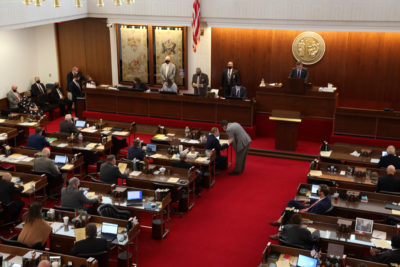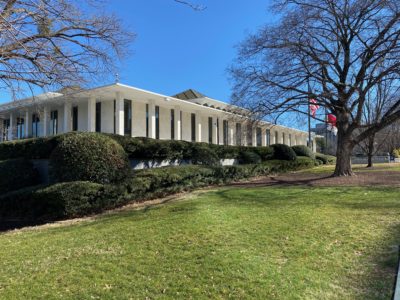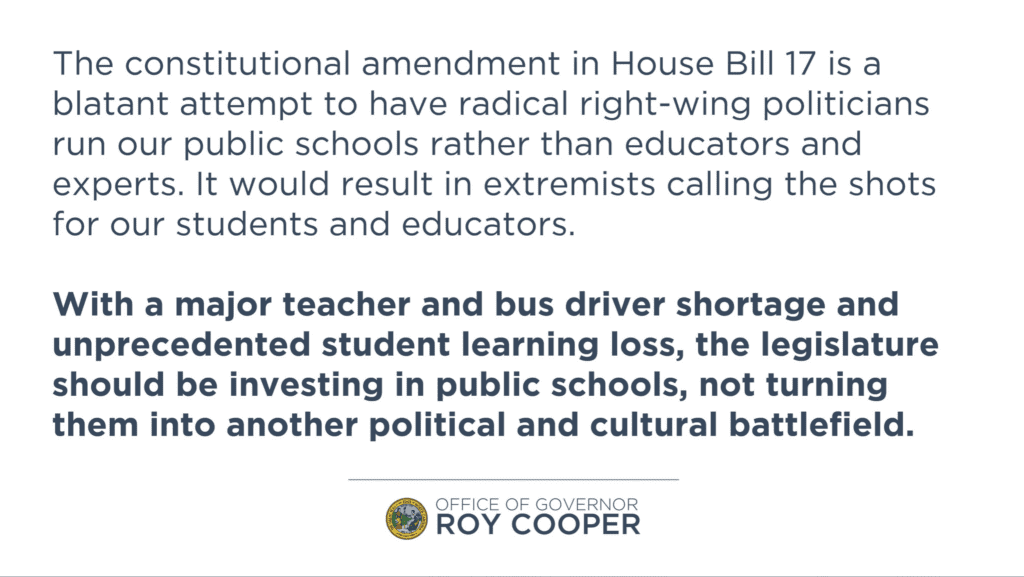
Share this story
|
|
Updated March 31, 2023:
It was a big week at the General Assembly, with the House releasing its biennium spending plan and hearing it in committee. You can check out my coverage of that here and here.
Meanwhile, a bill that would radically expand the opportunity scholarship program was filed in the Senate. Mebane Rash has a write up of that here.
The House K-12 education committee met Tuesday and took up a number of bills, including one that would allow registered nurses to work in school without any further certifications.
That bill went on to pass the full House this week as well. Liz Bell covered that committee. Check out her coverage here.
Next week, the full House will take up the budget bill, so stay tuned for that. Other than that, the legislative calendar is pretty quiet.
On a personal note, today is my final day at EdNC. It’s been a privilege to work here and to be able to write for everybody interested in education. I have a fuller note on my departure that you can read here.
And, as always, go to the bottom of this post to see the full list of education bills filed so far this session.
Updated March 16, 2023:
It was a quiet week at the General Assembly, but you might consider it the calm before the storm. The House is supposed to release its budget proposal next week, so stay tuned for way more action.
Meanwhile, the halls of the legislature weren’t completely silent this week. Lawmakers passed through the General Assembly a bill that would change the governance structure of the state’s two residential schools.
And then the House passed a couple of bills that we’ve written about previously, including a so-called anti-CRT bill, which you can read about here. And a bill that would allow students in certain Georgia counties to attend a North Carolina community college at in-state tuition prices. Read more about that here.
In addition, the House passed a bill that would require three credit hours in American history or government in order to graduate from a UNC System school with a baccalaureate degree or a community college with an associate degree. And the Senate passed a bill that makes teacher licensure changes.
Also, EducationNC reporter Liz Bell filed the following report from the legislature earlier this week:
Parents, educators, and advocates gathered Tuesday with Parents for Educational Freedom in North Carolina (PEFNC) at the General Assembly to push for the expansion of scholarships to nonpublic schools.
“All families want is the opportunity to decide what school best fits the needs of their child and be able to get to that school regardless of whatever their economic status is,” said Mike Long, PEFNC president.
The group is backing House Bill 420, filed Tuesday by Rep. Donnie Loftis, R-Gaston, which would expand opportunity scholarships and the Education Student Accounts (ESA+) program, both of which use public money to help families pay for nonpublic education options like private and home schools. ESA+ currently funds those options for students with disabilities.
Over 10 years, the bill would combine the two programs, expand eligibility to all children, and allocate increased funds each year — reaching an annual $1.3 billion by 2026-27. By 2032-33, the state would be giving $1.54 billion to the program each year.
Sen. Jim Burgin, R-Harnett, attended a PEFNC luncheon, and said he was planning to file a similar bill in the Senate.
“Over a 7-year period, we’re going to let all the money follow the child wherever they go,” Burgin said. “… I think we need more competition in education and this is a good way to do it.”
Cheryl Riley, principal of Victory Christian Center School in Charlotte, said 101 of the school’s students are receiving opportunity scholarships — nearly half of the school population.
“Education is not a one-size-fits-all, and because our children are different, people need different ways of meeting their needs,” Riley said.
Read more



Updated March 16, 2023:
It’s been a busy week for education in North Carolina. The big thing to know is that Gov. Roy Cooper released his two-year spending plan Wednesday. It was met with skepticism by Republicans, and since they largely hold the power when it comes to passing a budget, it’s safe to say that whatever budgets they propose will be radically different.
On Thursday, Cooper visited Scurlock Elementary School in Hoke County and Northern Guilford High School in Guilford County to highlight the education portions of his proposed budget.
“North Carolina has the best teachers in the country,” he said in a press release. “We must provide educators with the pay and respect they deserve so we can keep and attract more of them and my budget makes those critical investments.”
Read our coverage of Cooper’s budget here.
A House K-12 education committee tackled the so-called anti-Critical Race Theory bill, as well as a bill that would give educators more leeway when it comes to disciplining students for infractions. We wrote separate article on those two bills, so click on the links in this paragraph to read about them.
The HBCU caucus met Wednesday and talked about its priorities. Read about that here.
And a House community college committee met Thursday. Read about that here.
The House K-12 committee heard about another bill this week that could have serious ramifications as a precedent if it passes.
The bill, called School Assignment Zones, is local to Onslow County. Basically, it would give students the chance to go to whatever school is closest to where they live. Rep. Phil Shepard, R-Onslow, is a sponsor of the bill and presented on it during the committee.
He said that several parents in the district have come to him presenting the following problem:
“Some of these parents live in an area that’s about six miles from a local high school that has six empty classrooms. However, they’ve been bused about 20 miles to another school that is overcrowded, and so on and so forth,” he said. “For years this has been happening, and nothing has been addressed about it or no redistricting. Several have moved, and some have gotten permission for their children to go to the other schools, but they have to provide their own transportation.”
Shepard said he heard from the superintendent of the district, who has questions about the bill. He described the superintendent as not “totally opposed to this,” but said he is meeting with the superintendent to talk about it. He also said he has agreed to talk in the future about redistricting in the district with community members.
Of course, busing policies in many districts are part of an effort to make sure there is diversity among the student population, among other reasons. Rep. Rosa Gill, D-Wake, touched on the trickiness of student assignment policies during debate.
“I know that student assignment is a very difficult task. I did it in Wake County for 10 years, and that was during the time when we had to build 19 schools in eight years, and our population grew well over 100,000,” she said. “Sometimes assigning students to the closest school based on capacity may be difficult, especially in the community where you have new developments and gentrification. So I’m asking the question: Are you sure that the school didn’t take into consideration all of the factors that influences assignment before they assign these kids, or is this just a dissatisfaction with the assignment?”
Shepard responded by saying: “That’s been taken into consideration, I’m sure.”
If this bill actually clears the General Assembly, that could pave the way for other school districts to seek legislation to essentially dismantle the policies they’ve been using to decide what kids go where.
Rep. Julie von Haefen, D-Wake, said she was worried about the precedent and the “micromanaging” of school district decisions.
The bill goes next to the House committee on local government.
One other thing that happened at the end of the week was the 10th anniversary of the Center for Safer Schools (CFSS) on Friday in Raleigh at the education building.
The center came into existence following the 2012 school shootings at Sandy Hook Elementary School.
“We have too many superintendents and principals with sleepless nights. Their work is important,” said State Superintendent Catherine Truitt of the center in a press release.
Read more about that event here.
The legislative committee calendar for next week is relatively quiet on education, but that could always change. As usual, scroll down to the bottom of this post for the most recently updated list of education bills filed in the General Assembly.
Updated March 10, 2023:
The week started off with the State of the State by Gov. Roy Cooper and ends with a Leandro hearing Friday, but there was plenty of legislative news in between.
Tuesday, there was a House K-12 education committee that included a statewide calendar flexibility bill and legislation that would allow charter schools to develop remote academies. Read our coverage of that here.
And Thursday, members of the early childhood caucus of the legislature met and talked through their priorities. Check out coverage of that from my colleague Liz Bell.
In other news, House and Senate leaders have agreed to a spending limit for the biennium budget. This is good news because that means they can actually get started on working out their respective budget plans and hopefully pass it before the new fiscal year starts on July 1.
The spending limit is 6.5% growth in the first year and 3.75% in the second year, according to a press release.
“Reaching this agreement with the Senate on the overall spend is an encouraging start to crafting another responsible budget that addresses the needs of North Carolinians, including key investments in teacher and state employee raises, infrastructure, and workforce development,” said House Speaker Tim Moore, R-Cleveland, in a press release.
As a reminder, we are very early in the budget process. Democratic Gov. Roy Cooper will put out his budget plan first, followed by the House, and then the Senate. And then everybody needs to hash things out.
Cooper gave a glimpse of what might be in his budget proposal during the State of the State and doubled down in a press release later in the week.
He unveiled a $1 billion plan to address mental health and substance abuse, citing large rates of depression, anxiety, overdose, and youth suicide rates.
See his plan here.
“Our mental health system is under significant stress and in need of major investments to make sure every family, student and North Carolinian can get critical care,” Cooper said in a press release. “This plan tackles the ongoing mental health crisis in a direct and meaningful way by investing in the whole-person health of North Carolinians. It will empower workplaces, schools, and local governments in search of more ways to help their communities and most importantly, it will save lives.”
His mental health plan will be part of the budget that he releases “in the coming days.”
This week, the House passed a bill that makes computer science a required course for high school students. This is part of an attempt to increase the number of students pursuing computer science as a career. It went through a number of changes as it made its way through the House, ultimately ending as a standalone requirement. To make room for the new requirement, the number of required electives is being reduced by one. Now, on to the Senate.
The House K-12 committee will meet Tuesday at 1 p.m. Lawmakers will be taking up a number of calendar flexibility bills, as well as the so-called “anti-Critical Race Theory” bill, which is sure to be controversial. This bill mirrors similar legislation proposed and vetoed in 2021. You can read about the previous version of the bill here. Here is the version filed this session.
The committee will also be hearing a bill dealing with student discipline. The bill is sponsored by Rep. John Torbett, R-Gaston, who also chaired an interim education committee. Coming out of that committee, he said school discipline was an issue he wanted to tackle.
At the bottom of this post, you can find an updated list of all the education bills filed so far this session.
Updated March 3, 2023:
Things were slightly quieter in the halls of the General Assembly when it comes to education this week. Though, of course, there was a major announcement that will impact every aspect of the state budget, including education: Medicaid expansion.
Senate President Pro Tempore Phil Berger, R-Rockingham, and House Speaker Tim Moore, R-Cleveland, announced an agreement on Medicaid expansion yesterday in a joint press conference. This has been something Democratic Gov. Roy Cooper has been trying to make happen for years.
“An agreement by legislative leaders to expand Medicaid in North Carolina is a monumental step that will save lives, and I commend the hard work that got us here,” Cooper said in a press release. “Since we all agree this is the right thing to do, we should make it effective now to make sure we leverage the money that will save our rural hospitals and invest in mental health. I look forward to reviewing the details of the bill.”
The details of the compromise will be added to this bill.
The House K-12 education committee was supposed to meet this past Tuesday, but the meeting was cancelled. There were, however, joint education appropriations committees on Tuesday, Wednesday, and Thursday.
On Tuesday, lawmakers heard about legislative requests from the state Department of Public Instruction (DPI) and the community college system.
Here is the presentation on DPI’s legislative ask.
Here is the community college system’s ask.
On Wednesday, lawmakers heard the UNC System and Independent Colleges and Universities budget requests.
Find all the documents from those presentations here.
On Thursday, lawmakers heard about the COVID response from DPI, the UNC System, and the community college system. Find all the documents related to that here.
Other interesting bills filed this week include a charter omnibus bill that does a variety of things, including making sure “that State and local funds for students attending charter schools shall be provided in a manner that results in per-pupil funding approximately equal to that provided for students attending other public school units.”
Check out that bill here.
Next week, there is a House K-12 education committee scheduled at 1 p.m on Tuesday. It will take up a number of bills, including one that would grant calendar flexibility to all schools statewide.
You can stream that committee here.
As usual, you can find an updated list of all the education bills filed so far at the bottom of this post.
Updated Feb. 24, 2023:
It was a busy week at the legislature for education. A slew of calendar flexibility bills were heard in a House K-12 education committee, and then some of those bills passed the full House. The bills that passed the House only pertained to certain districts. But one of the bills in the education committee — one that would provide calendar flexibility statewide —is slated to come back before the committee at some point for a vote.
Next up, State Superintendent of Public Instruction Catherine Truitt is asking lawmakers to strengthen penalties against school teachers and staff who engage in sexual misconduct with students. The bill also creates penalties for administrators and others who fail to report such offenses to the State Board of Education. She talked to lawmakers about this Tuesday. You can read our coverage of that here and here.
And then Truitt also presented to a joint education appropriations committee Thursday about the legislative priorities of the state Department of Public Instruction and State Board of Education. Read about that here.
A bill I’ve been mentioning here for a while passed a state government committee this week. The bill makes computer science a required course for high school students. It is an attempt to increase the number of students who take computer science and perhaps enter into the field as a career.
The controversy has all stemmed around what will be lost if the bill becomes a required course. The original version had it replacing Earth science, and then another version had it being a standalone requirement, and the number of required sciences was reduced from three to two. The problem is that one of those sciences is Earth science, and it remained the one most likely to be cut.
The final version that passed the state government committee keeps computer science as a standalone requirement, but instead of reducing the number of required sciences, it reduces the number of required electives. Thus, computer science would become a requirement and Earth science would be saved. The bill goes next to the House rules committee.
And then there were some interesting bills filed this week. Perhaps the most significant is a so-called “anti-Critical Race Theory” bill that mirrors similar legislation proposed and vetoed in 2021. You can read about the previous version of the bill here. Here is the version filed this week.
Another bill of interest is one that would deal with student discipline. Coming out of a committee in between legislative sessions that tried to reimagine education, Chair Rep. John Torbett, R-Gaston, mentioned that school discipline was an issue he wanted to deal with. This bill is sponsored by him, so you should expect this to get a hearing.
Next week, there are joint education appropriations committee meetings Tuesday and Wednesday scheduled so far. They start at 8 a.m. Stream Tuesday’s here. Stream Wednesday’s here.
I expect legislators to take a further look at DPI and the State Board of Education’s budget requests, and also to hear from the community college system about its legislative requests.
See all the education bills filed so far this session at the bottom of this post.
Updated Feb. 17, 2023:
The joint education appropriations committee heard an overview of the community college system on Thursday. But while the presentation might have been routine, some of the legislators’ comments weren’t.
In response to information about the decline in enrollment at community colleges, Sen. Dean Proctor, R-Catawba, suggested a relatively controversial move.
“At some point we need to look at consolidation of community colleges,” he said. “I don’t think we can continue to have the decline of enrollment and justify all the campuses and expenses that we have. It’s a difficult subject. It’s not a welcome subject, but at some point, that needs to be done.”
Sen. Bobby Hanig, R-Currituck, attributed the decline in enrollment to the relative health of the economy. He said that enrollment is already starting to come back up, in part because of the need to serve businesses moving to North Carolina. And then he gave an impassioned plea for the importance of community colleges.
“It’s called a community college for a reason, because it’s in your community,” he said. “If we start taking away community colleges, we are shooting ourselves in the foot. These folks provide an unimaginable resource for especially rural areas that don’t have the opportunity to be 10 minutes from the university.”
Later he talked about the difficulties community colleges have because their faculty pay is relatively low.
“We see such a downtick or such a disparity between a community college professor versus a university professor, oftentimes we can’t fill the position, so therefore we can’t offer the class. So that also results in hurting the community colleges,” he said.
He then mentioned that faculty pay at community colleges has been increased by lawmakers recently and that the General Assembly must continue to keep increasing funding for that.
You can see the presentation on community colleges from that committee here. You can read more about what to expect during this long session for community colleges here.
In other news, I’ve been mentioning for a while now this bill that would make computer science a required course for high school students. The House K-12 committee took it up and gave it a favorable vote this week.
I’ve written before about why this bill is something being sought by the state Department of Public Instruction. You can read that here.
The crux of the debate over this bill seems to be concern over what it is replacing. The initial bill would have effectively replaced earth science as a required science course with computer science. The final version of the bill instead makes computer science a standalone required course, but to make room, it reduces the number of required science courses from three to two. Earth science is still the required science that is likely on the chopping block.
Another bill we mentioned last week passed another hurdle in the House this week. It’s the bill that could make the State Board of Education elected and put the state Superintendent of Public Instruction at its head. The bill, if passed, would put a proposal before voters to amend the constitution to allow these changes.
It passed the House K-12 education committee last week and the House Judiciary 3 committee this week. It goes next to the House rules committee.
I also mentioned last week the multiple bills about school calendar flexibility that have been filed in the House. They will get a hearing in the House K-12 education committee next week. While they may pass that committee as well as, eventually, the full House, the Senate is always the sticking point when it comes to calendar flexibility. I still don’t expect any of these bills to passed the full legislature.
That meeting is Tuesday at 1 p.m. You can listen here.
The joint appropriations committee will also be meeting on Tuesday at 9 a.m. to hear about the consensus revenue forecast. We wrote about that this week. The short version is that the state has a $3.2 billion surplus.
You can listen to that committee here.
Finally, a bill filed this week is an attempt by lawmakers to get tougher on school or district staff that take indecent liberties with or commit sexual offenses against students. It also increases penalties for failing to report “misconduct towards children.”
This is legislation that Superintendent Catherine Truitt mentioned as being an important priority of hers during a recent presentation to lawmakers.
As usual, see the updated list of education bills at the bottom of this document.
Update Feb. 10, 2023:
It was a big week for education in North Carolina. We covered the passage of the Parents’ Bill of Rights in the Senate. The proposal goes now to the House for consideration.
The House passed an education omnibus bill that basically puts the North Carolina Center for the Advancement of Teaching (NCCAT) under state Superintendent Catherine Truitt’s authority. Other aspects of the bill were a contract for learning loss software for schools and language that has DPI reporting to lawmakers about its efforts to reform the school accountability model.
And a bill that could make the State Board of Education elected and put the state Superintendent of Public Instruction at its head passed the House K-12 education committee. The bill, if passed, would put a proposal before voters to amend the constitution to allow these changes. It goes now to House Judiciary 3, which is scheduled to meet Tuesday at 3 p.m. You can watch here.
Interestingly, the only Democrat to vote for the bill was Rep. Tricia Cotham, D-Mecklenburg. To pass a proposed constitutional amendment requires three-fifths approval. That means the bill would need 72 votes by the full House to pass.
Republicans hold 71 of the chamber’s 120 seats, meaning they would need one Democrat to cross over to ensure victory. Given Cotham’s vote in the House education committee, she might be that one vote.
Democratic Gov. Roy Cooper tweeted a statement in opposition to the bill this week. Check it out below.

The House K-12 education committee meets again this coming Tuesday at 1 p.m. Among the proposed legislation it will be taking up is a bill that would make computer science a required science course for high school students. The committee was supposed to be taking it up this past Tuesday, but it was removed from the calendar.
I’ve written before about why this bill is something being sought by the state Department of Public Instruction. You can read that here.
And you can watch that committee meeting here.
There are also at least four bills so far that have been filed in the House trying to give school calendar flexibility to local school districts. Two of them are trying to institute flexibility statewide. This is a perennial topic at the General Assembly, one that is often given favorable consideration by the House and then ignored in the Senate. I have no reason to think this session will be any different.
There is a section on calendar flexibility in my legislative long session preview, which you can read here.
Correction: This post originally talked about the potential gubernatorial veto of a bill that would put a constitutional amendment on the ballot to elect the State Board of Education. The governor can’t veto bills with a constitutional amendment.
Updated Feb. 3, 2023:
A lot happened at the General Assembly this week, and we were there to let you know about it.
The top news was the reintroduction and movement through Senate committees of the Parents’ Bill of Rights legislation modeled after similar legislation from last year. Read Hannah McClellan’s excellent coverage of that here.
On Tuesday, the House education committee took up legislation that had a number of parts. I paid particular attention to the portion of the bill that basically puts the North Carolina Center for the Advancement of Teaching (NCCAT) under state Superintendent Catherine Truitt’s authority. Other aspects of the bill were a contract for learning loss software for schools and language that has DPI reporting to lawmakers about its efforts to reform the school accountability model.
Committee members also heard a presentation about the state of computer science in the state, which is relevant because the House K-12 committee will be taking up this coming Tuesday a bill that would make computer science a required science course for high school students.
Also in that committee, lawmakers will take up a bill that could make State Board of Education members elected and Truitt the head of the Board, if voters agree to a constitutional amendment. That’s Tuesday at 1:00 p.m. You can watch here.
And that’s just what we know about right now. There are always surprises. So stay tuned.
You can see an updated list of education bills filed so far this session at the bottom of this post.
The long session of the General Assembly officially kicked off this week, and with it came a slew of bills that would affect public schools and education.
Before we get into them, it’s important to remember that just because a bill is filed doesn’t mean it’s going to become law. In fact, most won’t. The first step is a committee or two, then the chamber floor, then the process starts over in the other chamber. If a bill manages to get an up vote in both chambers, it still needs to go to Gov. Roy Cooper. If he signs it, it becomes law. If he vetoes it, then there could potentially be a veto override vote in one or both chambers.
All that to say: When a bill is filed, it has a long road yet to go.
Having said that, there were a few interesting bills filed this week, some of which are more likely to make forward progress than others.
Probably the biggest one is this piece of legislation from Rep. John Torbett, R-Gaston, and Rep. Hugh Blackwell, R-Burke. These two were chairs of a committee that was meeting in between sessions and was tasked with reimagining education.
Blackwell mentioned in at least one of the meetings his perspective that the state superintendent should be the head of the State Board of Education, and that the State Board of Education should be elected. That is exactly what this bill would do, if voters agree to a constitutional amendment proposed by the legislation.
Currently, the Board members are appointed by the governor, who, at the moment, is a Democrat. And while the state superintendent attends Board meetings, she has no vote. This would change all that.
Torbett and Blackwell are also chairs of the House Education Committee, so I think it’s likely this bill will get some consideration this session. Also, this isn’t Blackwell’s first attempt at this. He’s filed a similar bill before.
Another bill would make computer science a graduation requirement and count is as a science credit. Currently, computer science is only an elective. This bill is part of an attempt to make computer science more attractive as a class for high school students.
It came out of a committee that met in between legislative sessions and examined how to get more women into STEM fields. Its primary sponsor is Rep. Erin Paré, R-Wake, who was a chair of that interim committee. Blackwell and Torbett are also sponsors, so again, it’s likely that this bill will get some consideration this session.
Separately, there is a bill that would have the UNC Board of Governors study making computer science a minimum requirement for admission to its universities. Blackwell and Paré are sponsors on this, as well as many others. This was also recommended by Paré’s interim committee.
Finally, there is a bill that would put the state superintendent in charge of the North Carolina Center for the Advancement of Teaching (NCCAT) and have the executive director of the organization report directly to her.
Another part of the bill would have the state superintendent report to the General Assembly on efforts and ideas around changing the state’s A-F school report cards. This is a big deal because many people — legislators from both parties, as well as educators — have been trying to change the formula used to determine school letter grades. Currently, 80% of that grade comes from academic performance and 20% comes from academic growth. And both of those measures rely on tests for their calculations.
The state Department of Public Instruction (DPI) is well underway on a project to figure out a better way of holding schools accountable. The efforts so far have revolved around finding multiple measures by which to judge schools and moving away from using tests as the main criteria in school accountability.
DPI is about to finalize its recommendations. It will be interesting to see what those are and how lawmakers respond to them. The bill has DPI sending a report to the General Assembly in February, and has state Superintendent Catherine Truitt presenting to lawmakers in April.
Again, Blackwell and Torbett are sponsors of this bill, so it is likely to get consideration.
OK, those are the most important bills I saw this week. Here, you can see our legislative committee guide, and if you need a refresher on how everything works, you can check out this primer on state government.
Below, you can see every bill that has been filed so far on education. All of them came from the House this week. So far, the Senate has been relatively quiet.
This list will be updated weekly. And each week, I will give my insights on what legislation you should be paying attention to and what is happening with them.
Correction: This article originally said that the bill about NCCAT moved the organization from the Board of Governors to the State Board of Education. The organization was moved to the State Board of Education in 2009.
Bills that have passed the General Assembly
H11: Schools for the Deaf and Blind
Bills that passed the House
H97: In-State Tuition Pilot Program
Bills that passed the Senate
S187: Teacher Licensure/Retired Educator Program
House Bills introduced
H3: UNC Report on Computer Science Credit.
H4: Increasing Engagement in STEM Grant Program.
H7: Stanly Comm. Coll. Safety Funds.
H8: Computer Sci. Grad. Requirement.
H11: Schools for the Deaf and Blind.
H17: Elect the SBE/SPI as SBE Chair
H24: Review of Federal Acts/Rules/Regulations.
H27: Elect Thomasville City Bd. of Ed.
H30: Reduce Length of Granville Bd. of Ed. Terms
H 31: Rowan-Salisbury Board of Educ. Filing Period
H38: Entry Fees for HS Interscholastic Events
H45: Address Pandemic Learning Loss/Alamance Co
H51: School Calendar Flex/Multiple Counties
H58: Parents’ and Students’ Bill of Rights
H62: An Act to Do School Calendars Better
H66: Catawba/Newton-Conover/Hickory Bd of Ed Elect
H67: Encourage Healthy NC Food in Schools
H70: School Calendar Flexibility/Halifax
H81: Increase Halifax Co. Bd. of Ed. Compensation
H86: School Calendar Flex/Statewide
H88: Guilford Board of Education Vacancies
H97: In-State Tuition Pilot Program
H99: Wake Co. Bd. of Comm. Elections/Nonpartisan
H100: Regional Firing Range/Alamance CC
H106: School Calendar Flexibility/Forsyth,WS,Stokes
H111: School Calendar Flexibility/Durham and Person
H115: School Calendar Flexibility/Catawba & Cities
H129: School Calendar Flexibility/Pitt County
H131: Protect NC Ed. Savings & Investment Accounts
H136: Arts High School Diploma Endorsement
H141: Paid Parental Leave for State Employees
H142: Protect Our Students Act.-AB
H149: Remote Charter Academies
H150: School Contracted Health Services
H154: Funds/Forsyth United Way/Summer Learning
H158: Stanly CC/Contract Date & MCC Status
H160: School Cal. Flexibility/Buncombe & Asheville
H163: School Calendar Flexibility/Craven Co
H166: American Indians Graduating with Honors Act
H174: Stagger Winston-Salem/Forsyth Bd. of Ed. Term
H176: School Calendar Flexibility/Lee
H179: Pamlico Bd. of Ed. Elect. Partisan
H185: Clarifying Sex Ed Time Frame
H188: Standards of Student Conduct
H195: School Calendar Flexibility/Roanoke Rapids
H205: Transparent Governance & Integrity Act.-AB
H206: Increase Dropout Age/Completion Indicator
H217: Higher Ed Savings Grant Pilot Program
H221: School Cal Flexibility/Yadkin & Davie Co
H222: No CV19 Vaccine Mandates for NC Students
H236: School Calendar Flexibility/Carteret
H239: School Calendar Flexibility/Johnston Co
H244: Partisan Bd.ofEd. Elections McDowell/Mitchell
H253: Prevent Students From Harm Act
H254: Storage of Firearms to Protect Minors
H257: School Calendar Flexibility/Multiple Counties
H269: Replace EOC with National Assessment
H276: Salisbury Academy Community Center
H280: Teacher Licensure/Retired Educator Program
H306: School Calendar Flexibility/Granville & Vance
H308: Alexander Co. Bd. of Ed. Referendum
H314: Public School Ethics Training
H328: Central Carolina Community College Funds
H330: School Athletic Eligibility Appeals to SI
H333: Restore State Emp/Teacher Retiree Med Benefit
H336: Healthy Students – A Nurse in Every School
H340: Medicaid Children & Families Specialty Plan
H342: Extend Child Care Compensation Grants
H343: Increase Rates/Set Floor/Child Care Subsidy
H345: Student Tax Reduction (STAR) Act
H348: Vance-Granville CC Manufacturing Center
H366: Restore Master’s Pay for Teachers & ISP
H369: Restore Master’s Pay for Teachers & ISP
H375: Funds to Ignite Davie College Promise
H401: Funds for Dolly Parton’s Imagination Library
H405: Funds for Ready for School, Ready for Life
H406: Guilford County Schools Funding Requests
H418: ABC/Community College Athletic Facility
H420: Expand & Consolidate K-12 Scholarships
H432: Principal Licensure Changes
H446: Expedite Surplus Prop./Educational Orgs
H452: Franklin Co. Bd. of Ed. Elect. to Nov
H468: Camera Enforcement of Greensboro School Zones
H478: Support Students with Disabilities Act
H483: Auto Subsidy Eligibility/Childcare Tchr/Pilot
H497: Funds for NC Arts Council
H509: Reduce School Lunch Debt
H510: School Supplies Act of 2023
H512: Forgivable Loans/HBCU Supplemental Funding
H514: Reenact Child Tax Credit
H516: Funds for Historic Morgan School
H526: Turning High Achieving Students into Teachers
H531: Charter Sch. Tuition – Out-of-State Students
H534: Protecting School Employees
H538: Isothermal Community College Capital Funds
H546: Capital Project Funding for NCCU
Senate Bills introduced
S62: Schools for the Deaf and Blind
S72: Catawba/Newton-Conover/Hickory Bd of Ed Elect
S74: Parents’ and Students’ Bill of Rights
S87: State Emps./No Payroll Dues Deduction
S90: Searches of Student’s Person
S93: In-State Tuition Pilot Program
S94: Regional Firing Range/Alamance CC
S96: School Calendar Flexibility/Pitt Co
S103: Partisan BoEd. Elections/Henderson
S107: Fines and Forfeitures/Payment to Schools
S118: School Calendar Flexibility/Moore Co
S119: School Calendar Flexibility/Cumberland Co
S139: American Indians Graduating with Honors Act
S150: Make McDowell Co. Bd. of Ed. Elect. Partisan
S155: Mitchell County Bd. of Ed. Elect Partisan
S170: School Cal. Flexibility/Multiple Counties
S177: Teacher License Reciprocity
S178: Greensboro/School Zone Elec. Enforc
S179: Extend Sunset/Buncombe Co./CC Projects
S180: Edgecombe County School Nurses
S181: Pitt County School Nurses
S184: Restore Master’s Pay for Teachers & ISP
S185: Restore Educator Longevity
S187: Teacher Licensure/Retired Educator Program
S193: Career Development Plans
S194: Student Borrowers’ Bill of Rights
S196: Student Borrowers’ Bill of Rights
S197: Capital Project Funding for NCCU
S198: EvenYr Election/Mooresville/Graded School Dis
S202: Restore Master’s Pay for Certain Educators
S222: Charter Approval Process
S229: School Calendar Flexibility/Charlotte-Meck
S230: Approve American Leadership Academy Charter
S233: Alexander Co. Bd. of Ed. Referendum
S248: Change No. of Members on Nash Co. Bd. of Ed
S278: School Calendar Flexibility/Durham
S280: Central Park School Admissions Pilot Program
S285: Req. Consent/Early Voting/Char-Meck. Schools
S286: Make Pamlico Bd. of Ed. Elect. Partisan
S288: Increase Rates/Set Floor/Child Care Subsidy
S292: Extend Child Care Compensation Grants
S293: Tri-Share Child Care Pilot Funds
S295: Student Tax Reduction (STAR) Act
S323: Funds for Renovations to Ashley Elementary
S343: Protect the Children in Private Schools
S348: Extended-Year Teacher Contracts
S351: Statewide Year-Round School Study
S366: Ban Delta-8 & Delta-9 on School Grounds
S368: Enabling Opportunity Scholarship Reporting
S377: Community College System Salary Increases
S383: Protect Our Youth in Foster Care
S390: Reenact Child Tax Credit
S406: Choose Your School, Choose Your Future
S411: Students in Home School Take PSAT/AP
S413: Funds/Dolly Parton Imagination Lib./Childcare
Recommended reading




